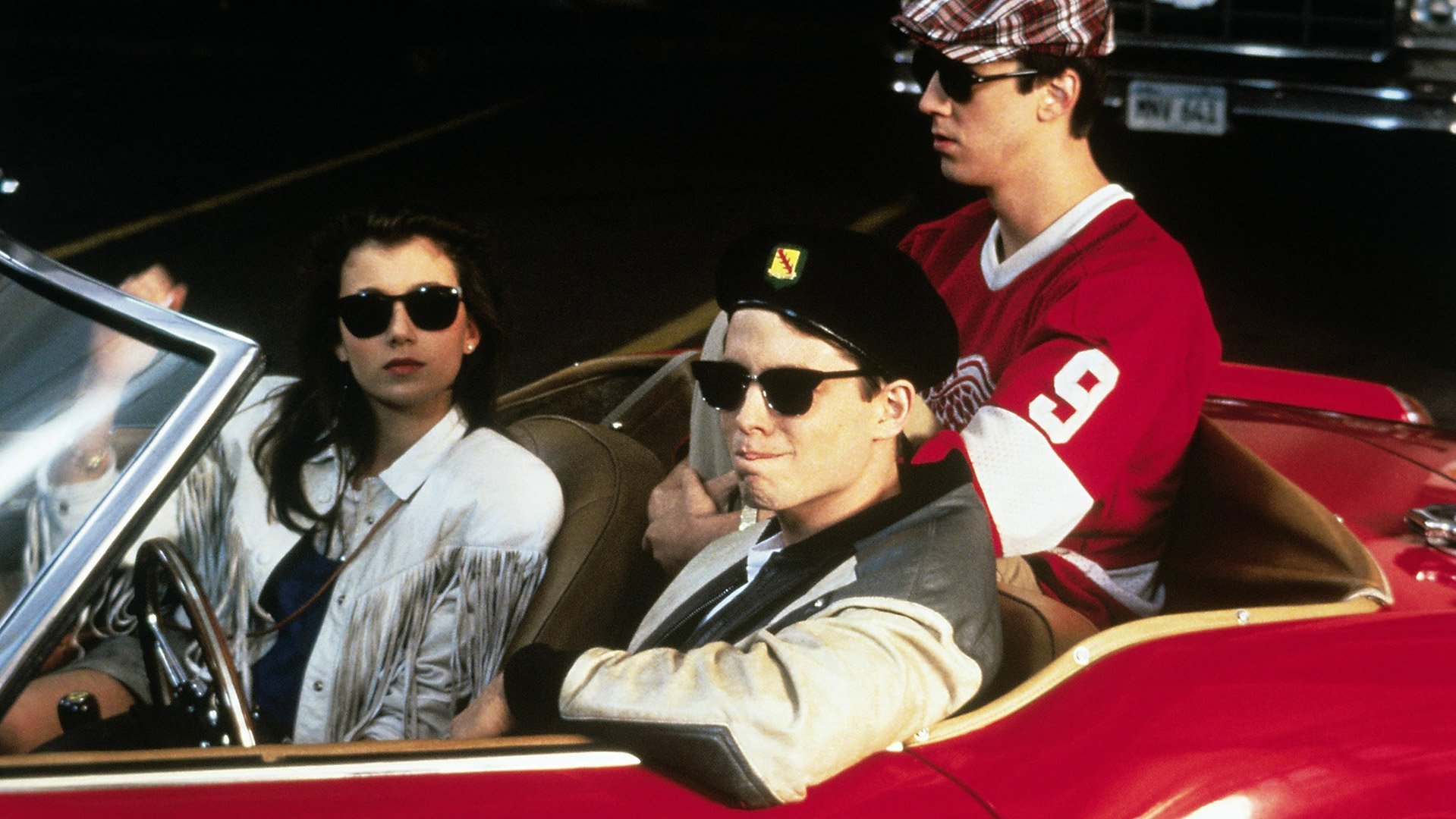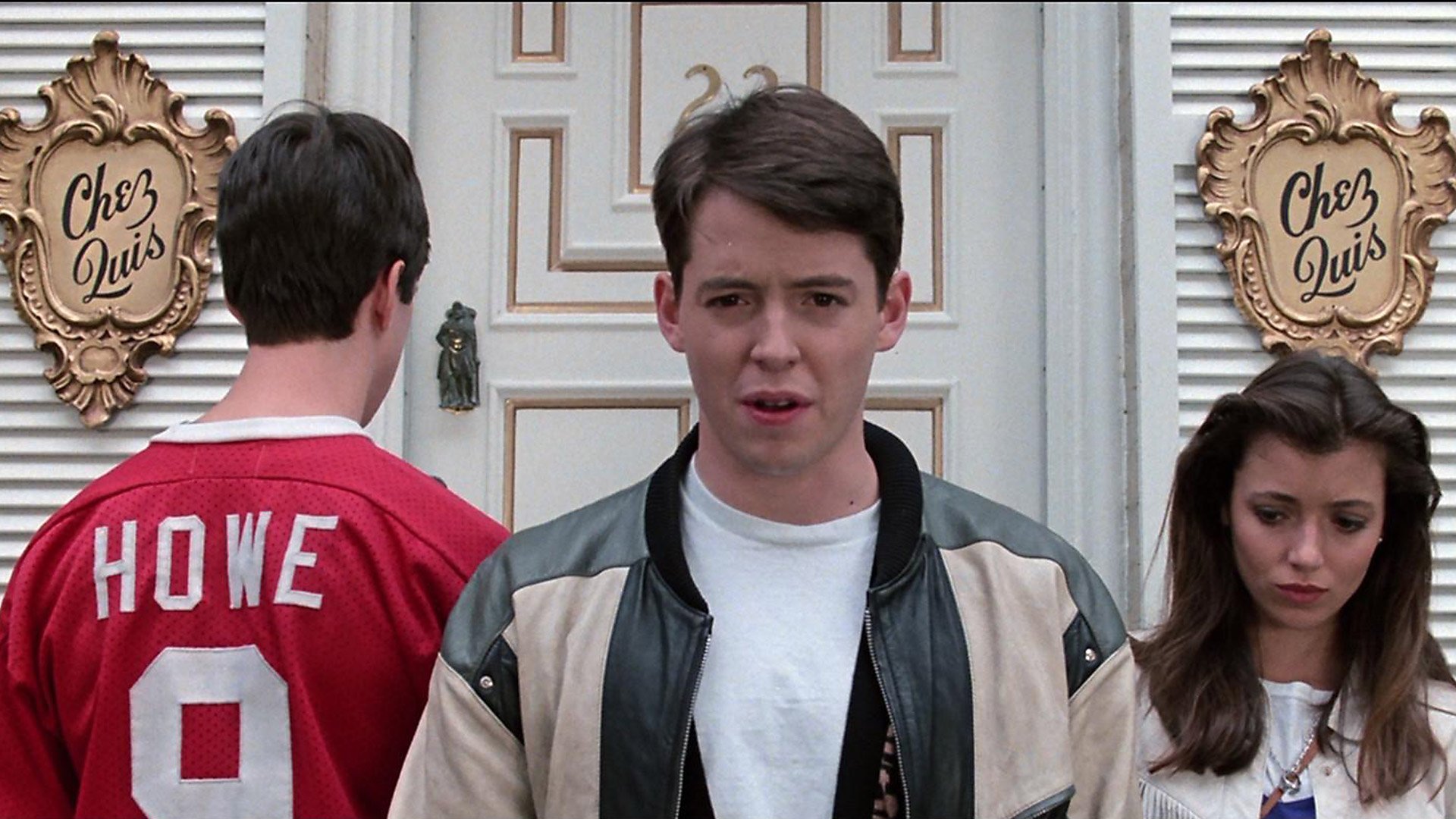IT’S HARD TO BELIEVE THAT A THREE-DECADE-OLD FILM ABOUT SKIPPING SCHOOL COULD HOLD THE KEY TO A BRIGHTER, HAPPIER LIFE. But there it is. Pigs fly, genetically you have nearly as much in common with a garden variety earthworm as you do with the guy sitting next to you, and FERRIS BUELLER’S DAY OFF just might be the best handbook for modern living since THE ART OF WAR. It’s debatable whether John Hughes knew what he was doing when he wrote, directed and produced the film. He was the pioneer of a new cultural trope – the wry, alienated teen flick – and, by ’86, the industry’s golden boy with his thumb on the Walkman™-calibrated pulse of the nation’s ripest demographic. But Ferris Bueller is not the typical John Hughes protagonist. Sure, he is wry, clever and dialed into the ephemera of counterculture. But he is also popular, gregarious, and well-adjusted. He is in many ways everything the typical Hughes icon isn’t. Ferris is out of compliance with the Hughesian norm, an anti-hero to the beleaguered Duckys, Benders and Samanthas. Though Ferris’ ideological leanings tap those of his peers, he’s not disaffected or pigeon-holed by them. He is inscrutable and eclectic. He’s not associated with any particular camp. He is not a jock, a freak, a dweeb, a burnout, a flake or a prom queen. He’s bits of all of them. More importantly, he doesn’t skip school because he’s bad at it, terrified of being pantsed, or crushing on the unattainable hottie. He does it because that life is too small. He is both too competent to gain from that world and too childlike to endure it. So, in a bound of logic so unwaveringly pragmatic that most adults couldn’t even actualize it, he simply decides not to. In orchestrating his emancipation, he draws on a well of talent and industry. He’s obviously not above doing a little hard work to get his day at Wrigley. First, he has to hard-sell his Eeyore-like friend Cameron to join him. Then he blindsides his nemesis Edward Rooney, duping him into excusing his girlfriend Sloane, all while hacking the high school computers. It’s the proactive approach at play (literally). And this is just the prep. He hasn’t even left home yet. What he does with his well-earned freedom reads like an aspirational bucket list. He drives a beautiful and unbelievably rare car; he goes to a day game at one of the last true outdoor baseball stadiums; he goes to the stock exchange, to the Art Institute, to the tallest building in Chicago, and to the beach; he eats sweetbreads at a fashionable restaurant, soaks in a hot tub and hijacks a parade. In short, Ferris behaves exactly as we all should – living life like we mean it. HUGHES SKETCHED TEEN LIFE AS AN ANALOG TO THE ADULT ONE. His teens are separated from us only by the thinnest of conceits. Like us, they are burdened by ungainly tests, obstacles, social constraints and expectations. And like us, they often don’t do much to address it. Ferris, on the other hand, deploys every cell of his being, every talent and skill, doing just that. The film was catharsis for Hughes, the last teen film he’d direct. He chose to step out on his own third act, declining all interviews, living a secluded life in Wisconsin — like a latter-day Salinger. The legacies of BUFFY, THE O.C., FREAKS AND GEEKS, VERONICA MARS, 13 REASONS WHY, and even STRANGER THINGS, all owe a deep debt to Hughes. But Hughes never embraced the commodification of teendom and he was nonplussed by it. Even the successful can feel out of step with their lives. So, like Ferris, Hughes simply ditched. There’s no compelling reason to follow the slow downward suck of the daily grind, become just another grey flannel (I should say, business casual) victim of the mundane. It happens. Life loses its glamour. Routine is easier than being your own hero. I’m not going to mine the causes. Suffice to say, you can spend a lifetime tending to the garden and never take the time to live in it. Life gets away from you. That’s what the film tells us. It also tells us that it doesn’t have to be that way. FERRIS IS THERE TO REMIND US OF THE THINGS WE’VE LOST IN TRANSIT, OF THE ENDS FUELING THE MEANS. He does this by parsing what is and isn’t of value to his life and putting the extra effort where it counts. The power of an archetype like Ferris isn’t necessarily a literal one. We love the potential, the nearly attainable fantasy of the character. But nobody is stopping bullets with their mind or turning back time. Ferris is the man precisely because he doesn’t do the impossible. There’s nothing superhuman about him, except, maybe, his ability to anticipate. It may look like he’s pulling rabbits out his Air Cavalry beret but only because he’s distracting us with the other hand. His “superpower” is a very concrete one. He simply makes the best of barely available outcomes seem accessible. The take away is that they are. Even to the rest of us. Like the kid says. “Life moves pretty fast. If you don’t stop and look around once in a while, you could miss it.” Taking Life Lessons from a Film About Ditching School
BY DYLAN YOUNG


![]()


